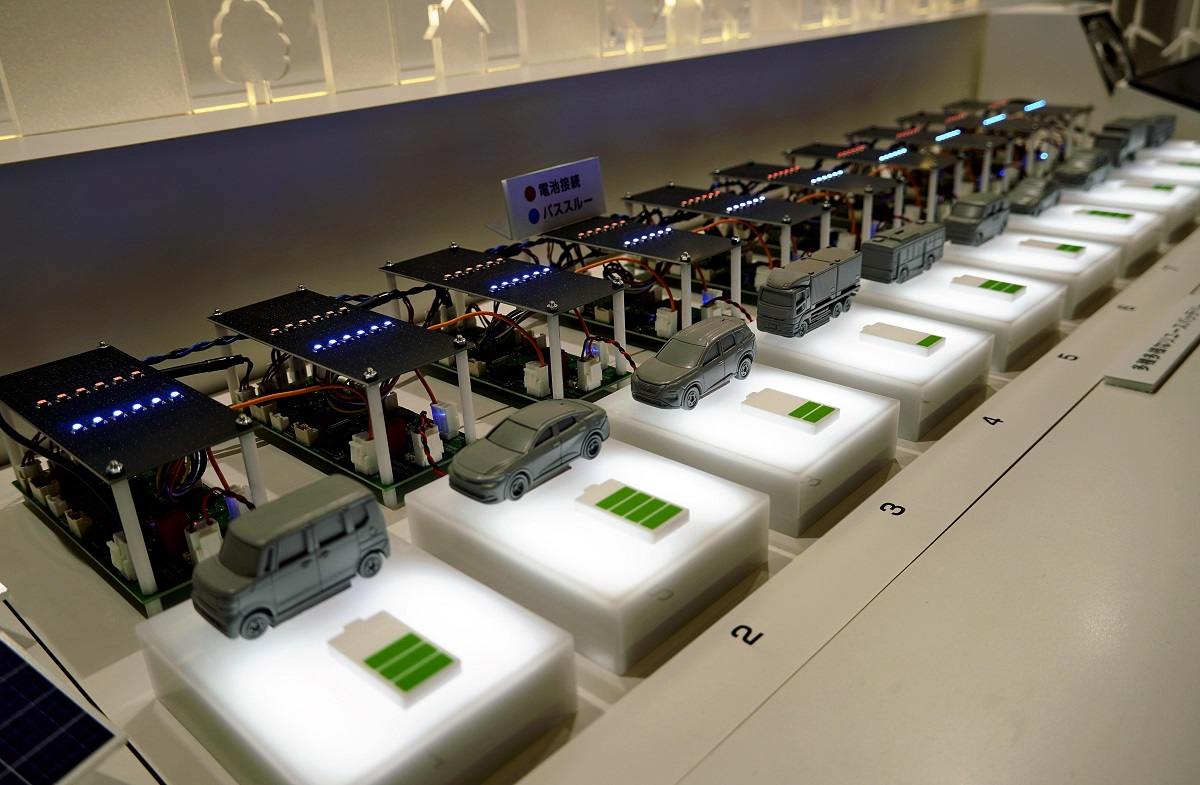Toyota, Other Japan Firms Speed Up Efforts to Reuse, Recycle EV Batteries; Keeping Key Mineral Resources in Japan Would Improve Economic Security

A model of Toyota Motor Corp.’s new electricity storage system is exhibited in Mihama Ward, Chiba City, on Friday.
11:26 JST, October 20, 2024
Japanese companies are speeding up efforts to develop technology that will make it possible to reuse or recycle electric vehicle batteries.
Japan has relied on China and several other countries for key mineral resources that are essential to producing batteries. However, if a system to reuse or recycle those materials within Japan can be developed, it would greatly improve the country’s economic security.
Currently, the resale value of a used EV is significantly lower than the price of a new one. However, if reusing and recycling EV batteries becomes more common, then the value of EVs will also change. If it is realized, the number of EVs on the road will likely increase.
During Japan Mobility Show Bizweek 2024, which took place from Tuesday through Friday in Chiba City, Toyota Motor Corp. exhibited its large-scale electricity storage system that was made by connecting used EV batteries.
What makes Toyota’s system unique is that it connects batteries that have different degrees of deterioration. It was difficult to do before, but the system can now charge and discharge more efficiently.
The system can also utilize batteries from different makers, increasing the possibility of more batteries being reused.
There have been many cases in which EV batteries could no longer be used for vehicles but could still be utilized for other purposes, leading to the question of how they can be reused.
Toyota is aiming to begin the operation of a system for industrial-use batteries in 2027.
Other companies are also developing new methods to utilize used batteries.
JERA Co., a major thermal power generation company, has developed a technology to collect about 90% of the rare metals from used EV batteries. Conventional methods can only recover about 60%. The company aims to put the technology into practical use in the first half of the 2030s.
Nissan Motor Co. announced this month it will begin selling an EV in the United Kingdom from 2026 that is equipped with technology, which will allow users to sell the energy stored in the batteries.
The price of new EVs tend to be high because the batteries are expensive, however, the resale value of a used EV tends to be significantly lower. This is due to systems surrounding battery reuse and other EV issues not having been established. It is something that needs to be addressed.
Currently, about 80% of EVs, which contain large amounts of valuable mineral resources, are exported overseas. As the government feels a sense of urgency surrounding EVs, it plans to enhance efforts to realize a circular economy by utilizing industrial, bureaucratic and academic circles.
The Japan Research Institute believes that if all used EV batteries are circulated within Japan, related markets will be worth about ¥8 trillion in 2050.
“Building an ecosystem of reusing and recycling [batteries] is important for the popularization of EVs,” Toyota President Koji Sato said in Chiba City on Friday.
Top Articles in Business
-

Prudential Life Insurance Plans to Fully Compensate for Damages Caused by Fraudulent Actions Without Waiting for Third-Party Committee Review
-

Narita Airport, Startup in Japan Demonstrate Machine to Compress Clothes for Tourists to Prevent People from Abandoning Suitcases
-

JR Tokai, Shizuoka Pref. Agree on Water Resources for Maglev Train Construction
-

Toyota Motor Group Firm to Sell Clean Energy Greenhouses for Strawberries
-

KDDI Opens AI Data Center at Former Sharp Plant in Osaka Prefecture; Facility Will Provide Google’s Gemini AI Model for Domestic Users
JN ACCESS RANKING
-

Japan Institute to Use Domestic Commercial Optical Lattice Clock to Set Japan Standard Time
-

Japan PM Takaichi’s Cabinet Resigns en Masse
-

Israeli Ambassador to Japan Speaks about Japan’s Role in the Reconstruction of Gaza
-

Man Infected with Measles May Have Come in Contact with Many People in Tokyo, Went to Store, Restaurant Around When Symptoms Emerged
-

Prudential Life Insurance Plans to Fully Compensate for Damages Caused by Fraudulent Actions Without Waiting for Third-Party Committee Review





















